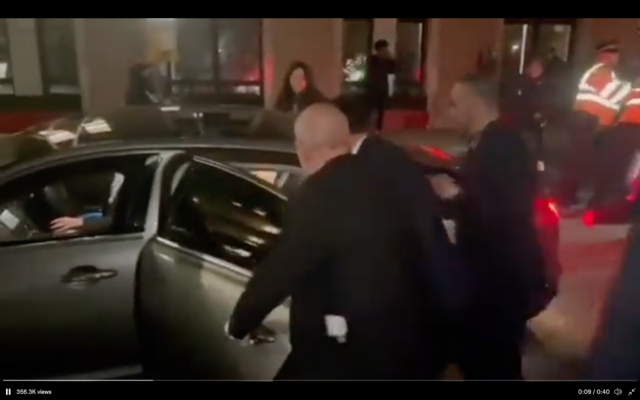Anti-Israel abuse at UK universities impacting on free speech, report claims
New report by Higher Education Policy Institute thinktank claims uni debates have been cancelled over fears of a repeat of the scenes that greeted Israeli ambassador to the UK when she took part in debate at the LSE
Lee Harpin is the Jewish News's political editor

Abuse directed at the organisers of a debate held at the London School of Economics (LSE) with the Israeli ambassador to the UK has left the institution reluctant to host future speaker events, a report has found.
The new report by the think tank the Higher Education Policy Institute (Hepi) says of the November 2021 debate with Tzipi Hotovely: “At the LSE, the ‘stress’ involved with hosting the Israeli ambassador split the committee, around half of whom resigned.
It made LSE reluctant to host future speaker events and reduced turnout to other events they ran.”
Hepi claim to have found a culture of “quiet no-platforming” and a climate of fear ehich is now constraining free speech at universities.
Two events at Queen University Belfast – one on Israel, again featuring the ambassador, the other discussing abortion – were met with protests outside.
A president at the Oxford Union refused to hold a panel discussion on Israel and the Palestinians.
The just published report says students are scared to invite speakers regarded by some as controversial due to potential abuse, the lack of support from student unions and because of the cost of security.
It is claimed Liam Neeson, Harry Enfield, Tony Blair and Tony Abbott, the former Australian prime minister, are among names that student societies decided not to invite because of probable backlash.
It suggests unions or societies at Manchester, Oxford, St Andrews, Imperial College London and Cardiff had all shied away from inviting certain speakers.
The report said: “Protests and comments are legitimate and legal expressions of free speech; clearly targeted harassment is not. This backlash culture creates a climate of fear among student organisers who resultingly avoid difficult events.”
Researchers found that 19 universities, or 14 per cent, had official debating or politics societies that held at least one speaker event in 2021-22.
Of 502 speakers invited nationwide, 195 spoke at Cambridge and 183 at Oxford, compared with 124 across all other institutions.
The third-placed institution, Durham, invited 37.
An organiser at Imperial said they decided to avoid “political” events entirely after hearing about the incident at the LSE and that incident was also cited as a reason for caution by a Bristol society.
Manchester’s student union was described in the report as having been obstructionist and bureaucratic, turning down events and charging for room hire. UCL and Sussex students described their student unions as bureaucratic.
Josh Freeman, the author of the report, said: “Keen, thoughtful and motivated students are willing to debate tough issues on today’s campuses yet these students are shying away from difficult topics and controversial speakers because they fear a backlash.”

Thank you for helping to make Jewish News the leading source of news and opinion for the UK Jewish community. Today we're asking for your invaluable help to continue putting our community first in everything we do.
For as little as £5 a month you can help sustain the vital work we do in celebrating and standing up for Jewish life in Britain.
Jewish News holds our community together and keeps us connected. Like a synagogue, it’s where people turn to feel part of something bigger. It also proudly shows the rest of Britain the vibrancy and rich culture of modern Jewish life.
You can make a quick and easy one-off or monthly contribution of £5, £10, £20 or any other sum you’re comfortable with.
100% of your donation will help us continue celebrating our community, in all its dynamic diversity...
Engaging
Being a community platform means so much more than producing a newspaper and website. One of our proudest roles is media partnering with our invaluable charities to amplify the outstanding work they do to help us all.
Celebrating
There’s no shortage of oys in the world but Jewish News takes every opportunity to celebrate the joys too, through projects like Night of Heroes, 40 Under 40 and other compelling countdowns that make the community kvell with pride.
Pioneering
In the first collaboration between media outlets from different faiths, Jewish News worked with British Muslim TV and Church Times to produce a list of young activists leading the way on interfaith understanding.
Campaigning
Royal Mail issued a stamp honouring Holocaust hero Sir Nicholas Winton after a Jewish News campaign attracted more than 100,000 backers. Jewish Newsalso produces special editions of the paper highlighting pressing issues including mental health and Holocaust remembrance.
Easy access
In an age when news is readily accessible, Jewish News provides high-quality content free online and offline, removing any financial barriers to connecting people.
Voice of our community to wider society
The Jewish News team regularly appears on TV, radio and on the pages of the national press to comment on stories about the Jewish community. Easy access to the paper on the streets of London also means Jewish News provides an invaluable window into the community for the country at large.
We hope you agree all this is worth preserving.





















